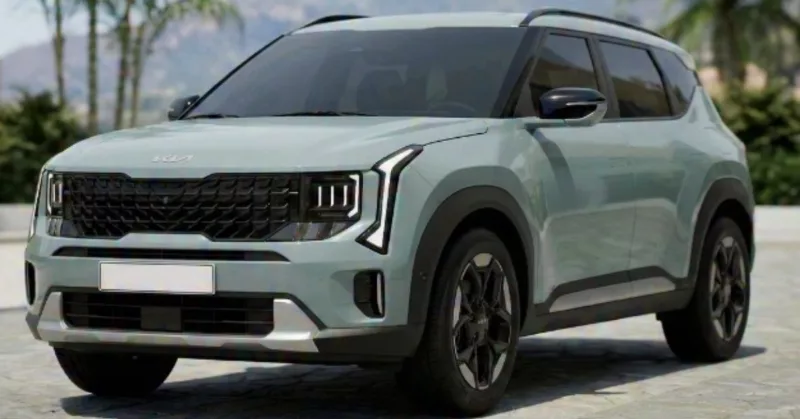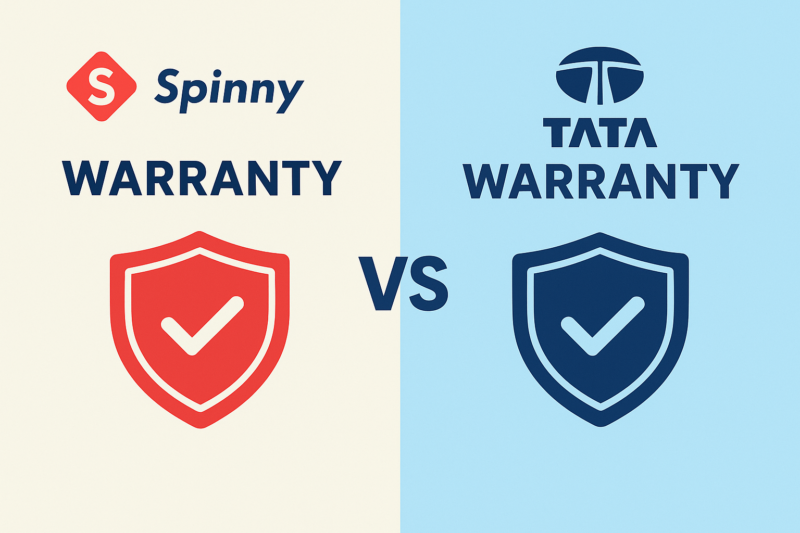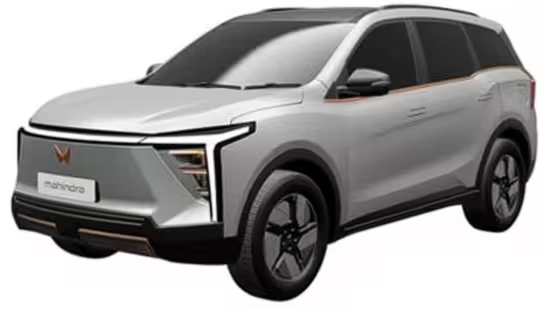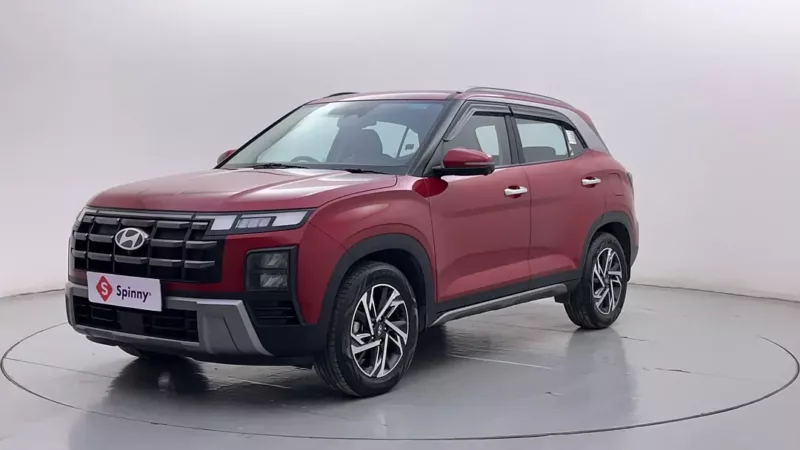In recent years, the automotive landscape has undergone significant changes with the advent of electric vehicles, not just across the globe – with over 14% vehicles worldwide being electric ones in the year 2022, but also in the Indian subcontinent. Here’s a quick stat – 72,930 four-wheeled electric vehicles were newly registered in India in 2023 alone. (!) Clearly, traditional petrol and diesel vehicles are being challenged by their electric counterparts due to lower power and maintenance costs in addition to the environmental benefits. And numbers are only going up from here on. So, as this industry evolves, the debate between petrol, diesel and electric vehicles continues to intensify and for potential buyers, a comprehensive cost analysis becomes increasingly important. This article delves into a detailed breakdown of costs associated with each type of vehicle over various periods and usage patterns, helping you make an informed decision about which vehicle best suits your needs.
Petrol Cars vs Diesel Cars vs Electric Cars: Cost of Purchase
A great vehicle for this comparative analysis would be the widely popular Tata Nexon with its petrol, diesel, and electric variant offerings. Since its launch in the year 2020, Tata Motors has sold over 50,000 units of its Nexon EV, evidently making it one of India’s preferred choices when it comes to electric cars, with a competitive mileage and relative affordability. For this article, let’s look at the Creative+ and Fearless+ S variants across petrol AMT, petrol DCA, diesel, electric medium range and electric long range types, starting with cost of ownership / purchase.
| Petrol AMT | Petrol DCA | Diesel | Electric MR | Electric LR | |
| Creative + | 12,49,990 | 12,99,000 | 13,89,990 | 14,49,000 | – |
| Fearless + S | – | 14,79,990 | 15,59,990 | 16,99,000 | 17,99,000 |
The initial cost of the Nexon EV variants is higher than petrol and diesel vehicles with the differences ranging from at least 4-5 lakh. While petrol options boast the lowest entry point, diesel models command a slight premium, reflecting their construction and materials used for the same. The electric variants being the most expensive, reflects the higher costs associated with the battery and its construction itself, as compared to those of a fuel engine.
Petrol Cars vs Diesel Cars vs Electric Cars: Efficiency & Cost
| Mileage | Range | |
| Petrol | 17.18 kmpl | up toupto 755.92 km |
| Diesel | 24.08 kmpl | up toupto 1059.52 km |
| Electric MR | 10.84 km/kWh | up to 325 km |
| Electric LR | 11.48 km/kWh | Uup to 465 km |
Let’s compare mileage and range across the variants against the price tags they come with.
With a full tank capacity of 44L, the petrol and diesel variants can allow you competitive distances of up to 755.92 km and 1059.52 km respectively. Diesel variants shine with their impressive mileage, ideal for long-distance travel enthusiasts. Petrol counterparts offer a balanced blend of affordability and performance, suited for daily urban commutes. Electric variants, while exhibiting lower range figures, showcase their potential for reduced operating costs over time. The electric medium range and long range Nexon variants pale in comparison to the fuel powered counterparts in terms of range with around 40% less distance travelled upon maximum fuel / power consumption.
Similarly, there are large gaps when it comes to comparing mileage, especially given that the Nexon diesel variant is over 10 times more fuel efficient than the electric medium range type. So ICE vehicles, especially diesel cars, clearly steal the show when it comes to aspects like range and mileage.
Let’s assume a driving range of 1000 kms over a month and compare costs of fuel or power for 1, 5, 10 and finally even 15 years across these 3 vehicle types.
| Petrol | Diesel | Electric MR | Electric LR | |
| 1 Year Range | 12000 km | |||
| Mileage | 17.18 km/L | 24.08 km/L | 10.83 kWh/km | 11.48 kWh/km |
| 1 Year Fuel / Battery Cost (in Rs.) | 66,161 | 44661 | 8,864.27 | 8,362.37 |
| 5 Year Fuel / Battery Cost (in Rs.) | 330805 | 223305 | 44,321.33 | 41,811.85 |
| 10 Year Fuel / Battery Cost (in Rs.) | 661610 | 446610 | 88,642.66 | 83,623.69 |
| 15 Year Fuel / Battery Cost (in Rs.) | 992415 | 669915 | 132,963.99 | 125,435.54 |
| (Petrol – Rs 94.72 /litre, Diesel – Rs 89.62 /litre, EV charge – Rs 8 /unit, New Delhi) | ||||
However, if you zoom out and examine these ranges in the larger picture, the per unit cost for charging an electric vehicle is a whopping 10 times lower than the per unit cost of the fuel and therefore, that ultimately allows you to drive more while also taking it easy on your bank balance. So over the course of a year, for the same exact range, you’d be spending at least over 8 or 9 times more on fueling up if you had the petrol powered Nexon than you would on your Nexon EV variant.
It’s safe to say that when it comes to running costs, the electric variants distinctly outshine their fuel powered competitors simply owing to the fact that charging these vehicles costs a whole lot less than your regular petrol or diesel costs. Here, diesel powered variants provide a good balance on the mileage for their associated fuel cost, however, still remain unbeatable by EV unit charge costs.
<H2> Petrol Cars vs Diesel Cars vs Electric Cars: Maintenance Cost
Here’s another winning point for team EV – maintenance costs. A lot of the engine maintenance costs that come with our petrol and diesel vehicles simply don’t exist with the electric cars because batteries are designed to be durable and require lesser attention. Not only that, but EVs also have relatively fewer moving parts – around 200, as opposed to more than 1000+ moving parts found in the conventional ICE vehicles.
Therefore, it goes without saying, electric cars require fewer repairs than petrol or diesel cars, with mostly tyre replacements and servicing being the primary focus rather than filter replacements, oil changes, fuel and transmission system inspections etc.
This table weighs up estimated maintenance costs across Nexon Petrol, Nexon Diesel and Nexon EV exemplifies the substantial differences across variants when it comes to costs associated with vehicle servicing and maintenance.
Variant | Tata Nexon Petrol | Tata Nexon Diesel | Tata Nexon EV |
| 1st Year Service | 4446 | 5975 | 3000 |
| 2nd Year Service | 4446 | 5975 | 3000 |
| 3rd Year Service | 5928 | 7458 | 3000 |
| 4th Year Service | 4446 | 5975 | 3000 |
| 5th Year Service | 4827 | 5975 | 3000 |
| Total Maintenance Cost over 5 Years | 24093 | 31358 | 15000 |
The need to spend on a variety of aspects is eliminated with EVs owing to mechanical differences, allowing you to save up at least half the amount if you compare diesel cars with electric ones and by roughly 1.6 times if you compare petrol cars with electric ones.
Evidently, diesel variants cost the most to maintain with petrol giving a good balance between the two but again, the savings on EV maintenance are considerably great, making it a competitive choice across the variants.
Petrol Cars vs Diesel Cars vs Electric Cars: Cost of Running
Now that we have a fair breakdown of the costs associated with fueling up or charging along with the services and repairs factored in as well, we can get a better picture of the total running costs over a 5 year period.
| Variant | Tata Nexon Petrol | Tata Nexon Diesel | Tata Nexon EV MR | Tata Nexon EV LR |
| Ownership Cost | 1479990 | 1559990 | 1699000 | 1799000 |
| 5 Year Fuel / Battery Charge Cost | 330805 | 223305 | 44321 | 41812 |
| 5 Year Maintenance Cost | 24093 | 31358 | 15000 | 15000 |
| Total Cost of Running over 5 Years (12000 km) | 1834888 | 1814653 | 1758321 | 1855812 |
Over a period of 5 years, the total running cost differs only marginally, reaching a maximum of Rs. 1 lakh across the vehicle types, with the Nexon medium range electric being your most economical option of all, while the same variant in long range costs the most overall. As is evident, the ownership cost of EVs accounts for a major portion of their overall expense, which is why the costs level up over this given time period, indicating that once bought, you are in for a good ride of savings and benefits as compared to petrol and diesel cars. Greater production and innovation are likely to bring the cost of batteries down, which would in turn reduce the purchasing cost of electric cars, bringing the overall costs down by significant amounts in the future and giving petrol and diesel variants fierce competition.
Petrol Cars vs Diesel Cars vs Electric Cars: Variable Cost of Ownership
With a good understanding of the total running costs across variants, let’s look at some use cases to examine this situation under different driving ranges so you can compare the three vehicle types according to what caters to your driving needs. We’ve picked three monthly ranges of 500 kms, 1000 kms, and lastly 2000 kms which leads to 6000 kms, 12000 kms and 24000 kms respectively, over a year’s time.
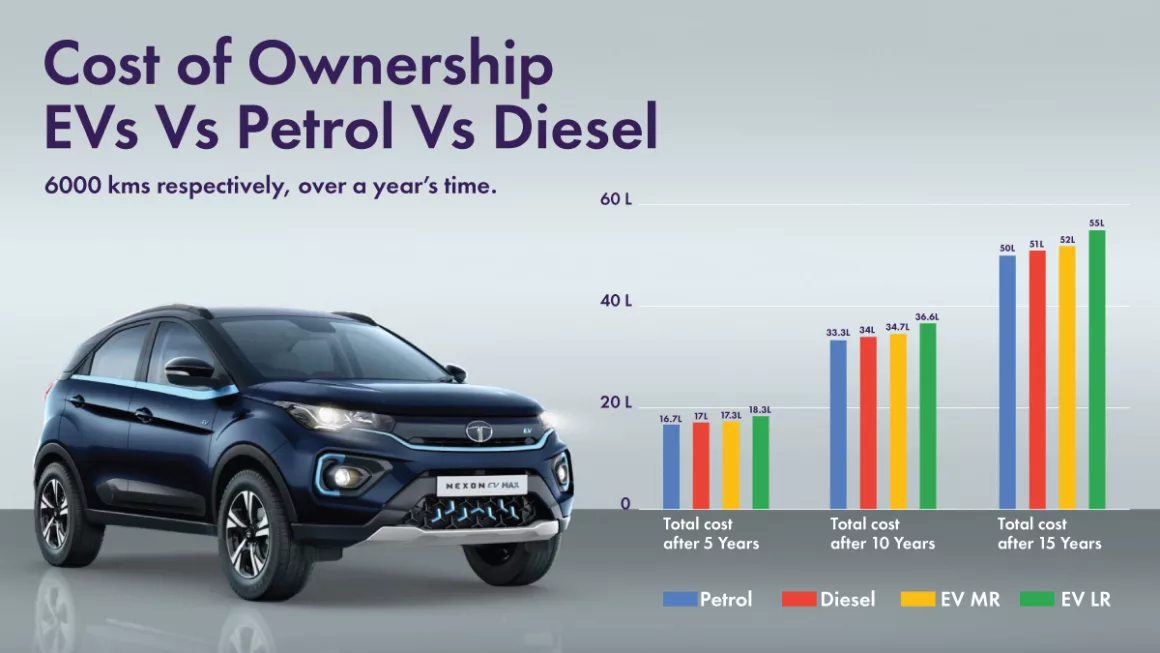
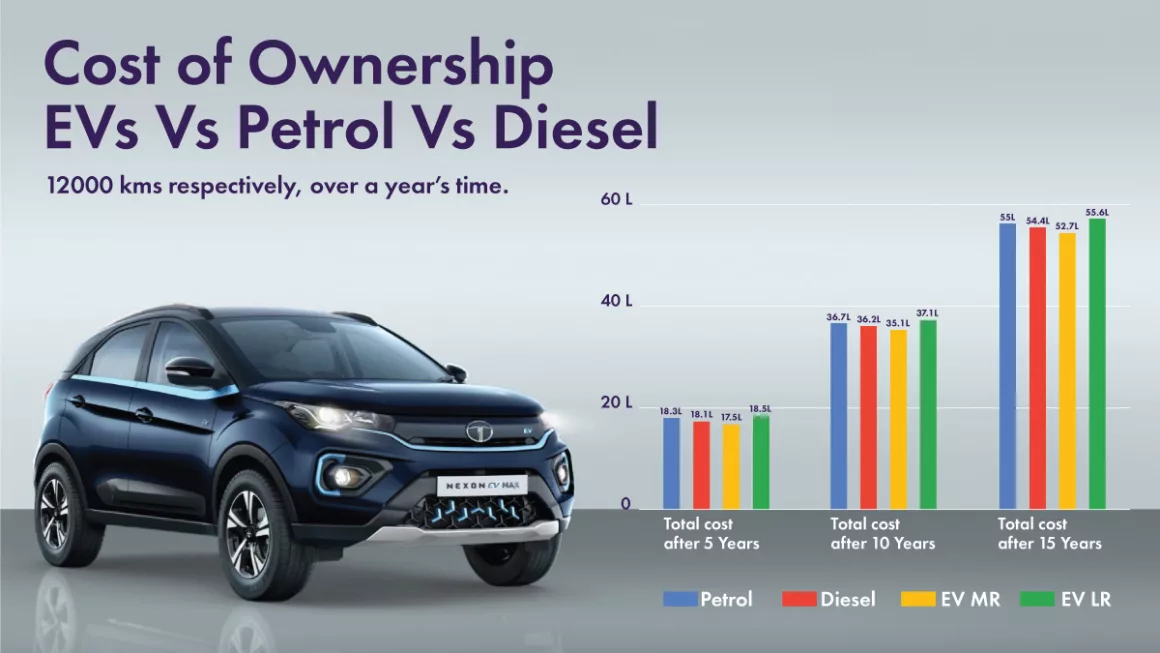
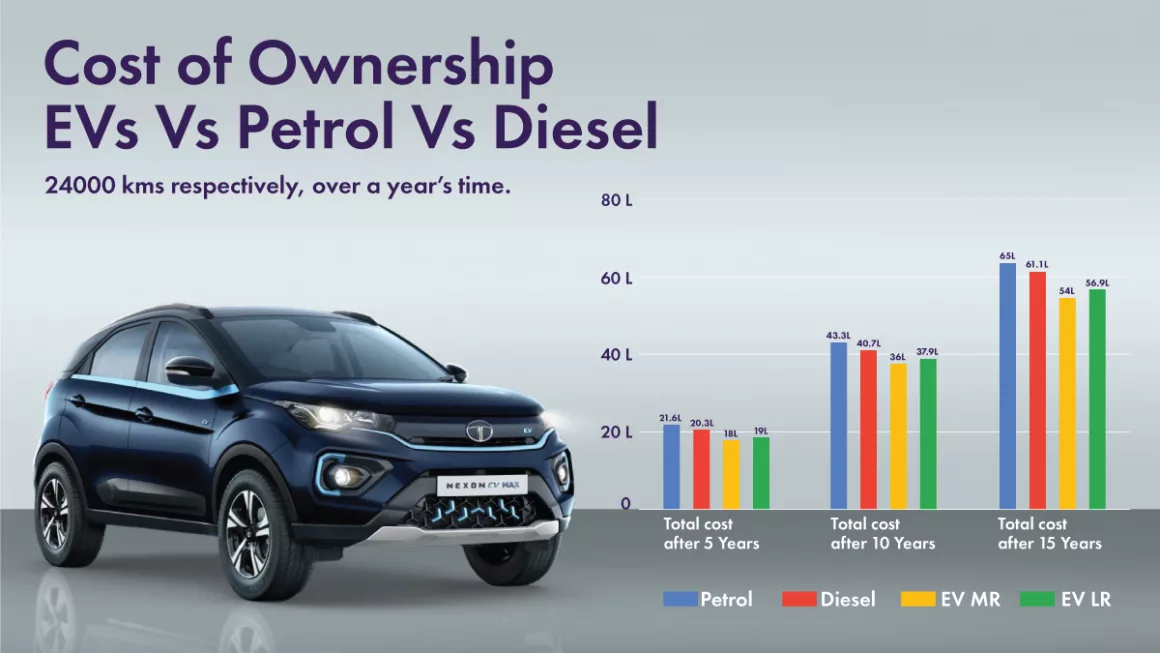
Here’s what we can say from the charts above:
- If you drive shorter distances, say only 500 kms a month, then it only makes sense to purchase a petrol car since that is the most economically feasible option over various time periods, be it 5, 10 or 15 years. Thus, for the daily commute, EVs don’t make sense and petrol or diesel cars are much better options.
- For the ideal / average driving range of 1000 kms monthly, an electric vehicle with battery capacity similar to the Nexon EV MR, i.e, 30 kWh is your best bet, where you consistently save up over time periods of 5, 10 and 15 years. Diesel vehicles take the second spot for this driving range.
- For longer driving ranges, your best option is yet again electric vehicles with battery capacities of 30 kWh and then 40.5 kWh. In this case, petrol cars are significantly pricier over the span of 5,10 and 15 years.
Which Should You Buy?
Given all of the context paired with this comprehensive cost-benefit analysis, purchasing an electric car proves to be a smart choice, not just with the scenario of Nexon variants, but also in general. While in the short-run, petrol and diesel cars can seem like the prime candidates but in the longer-run, they come with some serious costs unlike their electric counterparts where running costs are more than halved.
Deciding between petrol, diesel, and electric vehicles (EVs) hinges on several key factors: initial cost, fuel efficiency, maintenance, and usage patterns.
Petrol cars are the most affordable to purchase initially, making them a good choice for those with lower budgets or who plan to keep their vehicle for a shorter period. They are ideal for daily urban commutes and shorter distances, as they offer decent performance and lower maintenance costs compared to diesel engines. However, petrol cars incur higher fuel expenses over time, which can add up if you drive frequently.
Diesel cars, while more expensive upfront, offer superior fuel efficiency and are more economical for long-distance travel. They provide better mileage, making them suitable for those who drive over 15,000 km annually. However, diesel engines are more complex and require higher maintenance, which can increase overall ownership costs. Additionally, regulatory restrictions in some regions, such as the NCR’s ban on diesel vehicles older than ten years, may limit their long-term viability.
Electric vehicles (EVs), despite their higher initial purchase price, offer substantial savings on fuel and maintenance in the long run. They’re cheaper to operate due to lower electricity costs and have fewer moving parts, reducing the likelihood of costly repairs. Technological advancements and increased production are expected to drive down battery costs, making them more affordable over time. Furthermore, buying second-hand EVs can be a cost-effective option, as their batteries remain reliable and efficient for many years. EVs are an excellent choice for those looking to invest in a sustainable and cost-effective vehicle for the long term, especially as government incentives and infrastructure improvements continue to support their adoption.
In summary, the right vehicle for you depends on your driving habits and financial priorities. Petrol cars are best for short-term ownership and lower annual mileage. Diesel cars are ideal for high-mileage drivers who regularly travel long distances and can handle higher maintenance costs. EVs, with their lower running costs and environmental benefits, are the most economical choice in the long run, making them increasingly attractive as battery technology and charging infrastructure improve. As the automotive industry evolves, EVs are poised to become the dominant choice for both cost savings and sustainability.
FAQs about Petrol Cars vs Diesel Cars vs Electrics
Q: Which of the three has the most mileage – petrol cars, diesel cars or electric cars?
Diesel cars offer the highest mileage, followed by petrol cars and then electric cars. Though the low per-mile costs allow you to drive more in the case of electric cars.
Q: How does the initial purchase cost compare across petrol, diesel and electric vehicles?
EVs cost the most to purchase initially owing to the high cost of the battery itself. They’re followed by diesel cars and lastly, petrol cars which are generally the cheapest.
Q: What is the range of electric cars, compared to gas and diesel cars?
EVs can travel 200–500 km between full charges, whereas gas and diesel vehicles can travel 600–1000 km on a full tank.
Q: Which car type is the best for city driving – petrol, diesel or electric?
Since EVs produce no pollutants, operate quietly, and accelerate quickly, they are the ideal vehicle for city driving. Because of their reasonable fuel efficiency and reduced starting cost, petrol automobiles are also a good option for city driving.
Q: How reliable are electric cars compared to petrol or diesel cars?
Because they have fewer mechanical parts, EVs are more reliable . Cars that run on gasoline and diesel have more moving parts that can break down and need maintenance more frequently.
